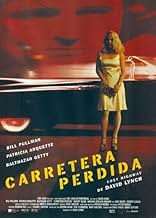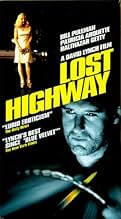Anonymous videotapes presage a musician's murder conviction, and a gangster's girlfriend leads a mechanic astray.Anonymous videotapes presage a musician's murder conviction, and a gangster's girlfriend leads a mechanic astray.Anonymous videotapes presage a musician's murder conviction, and a gangster's girlfriend leads a mechanic astray.
- Awards
- 4 wins & 6 nominations
- Director
- Writers
- All cast & crew
- Production, box office & more at IMDbPro
Storyline
Did you know
- TriviaAccording to co-writer and director David Lynch, the first scene in the film is based on an incident that occurred in his own life. He claims his intercom buzzed early one morning and when he answered it, a voice on the other end that he didn't recognize said, "Dick Laurant is dead." However, by the time he got to the front of the house to look out the window, there was no one outside.
- GoofsWhen Pete and Sheila are having sex in the car, external shots show the car parked alongside a wall in a dark, tree-covered section of street. Yet in interior shots, the wall is many metres away in the far background and is brightly illuminated.
- Quotes
Ed: Do you own a video camera?
Renee Madison: No. Fred hates them.
Fred Madison: I like to remember things my own way.
Ed: What do you mean by that?
Fred Madison: How I remembered them. Not necessarily the way they happened.
- Crazy creditsA Real Trooper-Guadalupe Hurst
- Alternate versionsAn unconfirmed report claims that a Director's Cut of the film exists which has a number of scenes deleted from the original 134 minute print. Some of the missing scenes include:
- A breakfast scene with Fred and Renee where Fred asks her where she was when he phoned her from the jazz club the night before, and when she says that she never left the house all evening, his suspicions of her cheating on him intensifies.
- Another scene of a third videotape arriving at Fred and Renee's house where they watch it and catch a glimpse of a cold-faced Fred on one frame. They phone the detectives Al and Lou again who pay them another visit.
- A scene set in the morgue where the attendant, George, prepares an autopsy on Renee's mutilated body where he is joined by a tuxedo-clad medical examiner and the examiner's girlfriend, Joyce, which is immediately followed by a courtroom scene where Fred literally faints after hearing the jury forewoman read the guilty verdict and the judge's sentence of death, which is only heard in the original version.
- A scene in a lingerie shop where two young women, Marian and Raquel, glimpsed only in the porno film at the end, talk about the Renee Madison murder and about the method of execution the state would use when they are interrupted by Andy who gestures for them to hurry up with their selections.
- Another scene follows where Andy, Marian and Raquel are involved in a drugged-out threesome orgy at his house.
- A prison scene where one inmate is shown being led out of his cell to the gas chamber with other prisoners taunting him and the guards preparing for the execution as if it was a formal gathering, plus another scene of Fred talking to the prison guards in the courtyard the next day.
- A full scene of dialogue between the prison warden and Pete Dayton's parents, Candace and Bill, where they are told of their son's whereabouts and his physical condition where he has a hematoma on his forehead and blepharitis, redness around the eyes. Bill and Candace are elusive to the warden's questions about Pete's whereabouts for the last few days. Pete is then brought into the office where he doesn't respond to questions asked, and Bill and Candace are told that they can take him home. After they leave, the warden then makes a statement to reporters outside his office about the disappearance of Fred Madison from the prison.
- Extended scenes of dialogue between Pete and his friends Steve V, Teddy, Carl and Lanie on their arrival at his house where Lanie shows them a scar on her abdomen from an operation she just had. Plus more dialogue as the four of them ride in Steve V's car, where they first arrive at a drive-in restaurant called Johnny's where they pick up Sheila and her two girlfriends and then drive to the bowling alley.
- An extra scene of Pete riding up Van Nuys Boulevard at night on his motorcycle after Alice had phoned him to cancel their evening get-together. Pete arrives at Johnny's Drive-In where he meets with Steve V, Carl and Sheila where Pete responds awkward towards them as he is having a mysterious headache. Pete then savagely beats up two guys who try to pick up Sheila, much to her shock.
- The telephone scene between Pete, Mr. Eddy and the Mystery Man is slightly extended with more dialogue with the Mystery Man telling Pete about him just killing some people and telling him more details about executions in the 'Far East' set to imply China during the Cultural Revolution.
- A brief scene of Fred Madison checking into the Lost Highway Motel and walking towards Room 25 which he knows is right next to Room 26 where Renee and Mr. Eddy are.
- SoundtracksI'm Deranged
Written by David Bowie and Brian Eno
Courtesy of Tintoretto Music (BMI) and Upala Music (BMI)
Performed by David Bowie
Courtesy of Jones Music and Virgin Records America, Inc.
Featured review
All hail David Lynch. All hail the other David Lynch.
Lynch is not a complex man, I think; it is easy to read him. But he is cinematically articulate and its a pleasure of a special sort when you meet an articulate artist. His interest is simply described: duals.
All his films work with some exploration of this idea. What makes him interesting is that he doesn't work the usual way, with a reality and then a surreal overlay. Both elements in his experiments are what we coarsely call "surreal." The game in traveling with him is an investment in the idea that there is no anchor to reality, that all references are among imaginations, sometimes twisted. "Mulholland" was a little too conventional for me because you could actually explain things and one of the realities was sorta real if you ignored a few things.
My favorite Lynch is "Velvet," which imposes the two warring realities on film genres. The most fun is the seemingly straight "Straight" story, which is perhaps the most bizarre encounters of dual strangeness because it seems so ordinary. Dualing roots that keep getting mowed.
But if you are into Lynch, this is an extraordinary pleasure, this one. Its the most obvious in plan, the least hidden in the swirl of two worlds. Neither world is anchored in reality and each hallucinates the other. Probably the only anchor with reality is the most disturbing character in appearance, The Robert Blake guy.
But even these two surrealities are nested in cinematic realities. One is the gangster movie, elevated to cosmic status by the French new wave. The other is visual jazz and the accompanying dream linkages that have been similarly blazed, starting with Dennis Hopper so far as American films.
What you are open to determines what you can get, I suppose. What Lynch provides is a sort of post-post modern notion of film as sometimes centered in itself, with its own cosmologies and lives that always refer to other film notions and never to real ones. There is no fold of us as viewer, no acknowledgment of our world at all (except for the mysterious videos). Celestial madness.
I prepared for this by watching four bad Holmes movies in a row. How we detect and discover is what this is about and is so superior to what we normally encounter, you should watch it.
Ted's Evaluation -- 3 of 3: Worth watching.
Lynch is not a complex man, I think; it is easy to read him. But he is cinematically articulate and its a pleasure of a special sort when you meet an articulate artist. His interest is simply described: duals.
All his films work with some exploration of this idea. What makes him interesting is that he doesn't work the usual way, with a reality and then a surreal overlay. Both elements in his experiments are what we coarsely call "surreal." The game in traveling with him is an investment in the idea that there is no anchor to reality, that all references are among imaginations, sometimes twisted. "Mulholland" was a little too conventional for me because you could actually explain things and one of the realities was sorta real if you ignored a few things.
My favorite Lynch is "Velvet," which imposes the two warring realities on film genres. The most fun is the seemingly straight "Straight" story, which is perhaps the most bizarre encounters of dual strangeness because it seems so ordinary. Dualing roots that keep getting mowed.
But if you are into Lynch, this is an extraordinary pleasure, this one. Its the most obvious in plan, the least hidden in the swirl of two worlds. Neither world is anchored in reality and each hallucinates the other. Probably the only anchor with reality is the most disturbing character in appearance, The Robert Blake guy.
But even these two surrealities are nested in cinematic realities. One is the gangster movie, elevated to cosmic status by the French new wave. The other is visual jazz and the accompanying dream linkages that have been similarly blazed, starting with Dennis Hopper so far as American films.
What you are open to determines what you can get, I suppose. What Lynch provides is a sort of post-post modern notion of film as sometimes centered in itself, with its own cosmologies and lives that always refer to other film notions and never to real ones. There is no fold of us as viewer, no acknowledgment of our world at all (except for the mysterious videos). Celestial madness.
I prepared for this by watching four bad Holmes movies in a row. How we detect and discover is what this is about and is so superior to what we normally encounter, you should watch it.
Ted's Evaluation -- 3 of 3: Worth watching.
Details
- Release date
- Countries of origin
- Official site
- Language
- Also known as
- Por el lado oscuro del camino
- Filming locations
- 7035 Senalda Road, Los Angeles, California, USA(Fred Madison's house)
- Production companies
- See more company credits at IMDbPro
Box office
- Budget
- $15,000,000 (estimated)
- Gross US & Canada
- $3,726,792
- Opening weekend US & Canada
- $212,710
- Feb 23, 1997
- Gross worldwide
- $3,836,866
- Runtime2 hours 14 minutes
- Color
- Sound mix
- Aspect ratio
- 2.39 : 1
Contribute to this page
Suggest an edit or add missing content



























